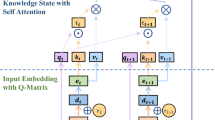Abstract
Knowledge tracing is the fundamental technology for constructing learner models that dynamically estimate and predict a learner’s knowledge state. While current research on knowledge tracing has improved the predictive capacity of the model by investigating the relationship between learners and problem concepts, these models become static after training. This limits their ability to adapt to the varying developmental stages of learners due to human diversity. Drawing inspiration from the synaptic plasticity that grants lifelong learning capabilities to the biological brain, this study incorporates plasticity weights into the Transformer architecture. This leads to the proposal of a deep knowledge tracing model designed to adapt to individual learner development. Moreover, it demonstrates significant performance improvements compared to the baseline model.
Access this chapter
Tax calculation will be finalised at checkout
Purchases are for personal use only
Similar content being viewed by others
References
Agarwal, D., Baker, R.S., Muraleedharan, A.: Dynamic knowledge tracing through data driven recency weights. International Educational Data Mining Society (2020)
Cen, H.: Generalized learning factors analysis: improving cognitive models with machine learning. Carnegie Mellon University (2009)
Citri, A., Malenka, R.C.: Synaptic plasticity: multiple forms, functions, and mechanisms. Neuropsychopharmacology 33(1), 18–41 (2008)
Cooper, L.N., Bear, M.F.: The BCM theory of synapse modification at 30: interaction of theory with experiment. Nat. Rev. Neurosci. 13(11), 798–810 (2012)
Corbett, A.T., Anderson, J.R.: Knowledge tracing: modeling the acquisition of procedural knowledge. User Model. User-Adap. Inter. 4, 253–278 (1994)
Hebb, D.O.: The Organization of Behavior: A Neuropsychological Theory. Psychology press (2005)
Huitt, W., Hummel, J.: Piaget’s theory of cognitive development. Educ. Psychol. Interact. 3(2), 1–5 (2003)
Kuhn, D.: The application of Piaget’s theory of cognitive development to education. Harv. Educ. Rev. 49(3), 340–360 (1979)
LeCun, Y., Bengio, Y., Hinton, G.: Deep learning. Nature 521(7553), 436–444 (2015)
Lefa, B.: The Piaget theory of cognitive development: an educational implications. Educ. Psychol. 1(1), 1–8 (2014)
Li, Z., Yu, S., Lu, Y., Chen, P.: Plastic gating network: adapting to personal development and individual differences in knowledge tracing. Inf. Sci. 624, 761–776 (2023)
MacLellan, C.J., Liu, R., Koedinger, K.R.: Accounting for slipping and other false negatives in logistic models of student learning. International Educational Data Mining Society (2015)
Piaget, J.: Piaget’s theory of cognitive development. Child. Cogn. Dev. Essent. Read. 2, 33–47 (2000)
Piech, C., et al.: Deep knowledge tracing. In: Advances in Neural Information Processing Systems, vol. 28 (2015)
Qiu, Y., Qi, Y., Lu, H., Pardos, Z.A., Heffernan, N.T.: Does time matter? modeling the effect of time with Bayesian knowledge tracing. In: EDM, pp. 139–148 (2011)
Rowe, J., Lester, J.: Modeling user knowledge with dynamic Bayesian networks in interactive narrative environments. In: Proceedings of the AAAI Conference on Artificial Intelligence and Interactive Digital Entertainment, vol. 6, pp. 57–62 (2010)
Yudelson, M.V., Koedinger, K.R., Gordon, G.J.: Individualized Bayesian knowledge tracing models. In: Lane, H.C., Yacef, K., Mostow, J., Pavlik, P. (eds.) AIED 2013. LNCS (LNAI), vol. 7926, pp. 171–180. Springer, Heidelberg (2013). https://doi.org/10.1007/978-3-642-39112-5_18
Acknowledgements
This work was supported by the Key Research and Development Program of Zhejiang Province (No. 2021C03141), the National Natural Science Foundation of China under Grant (62077015), the Natural Science Foundation of Zhejiang Province under Grant (LY23F020010) and the Key Laboratory of Intelligent Education Technology and Application of Zhejiang Province, Zhejiang Normal University, Zhejiang, China.
Author information
Authors and Affiliations
Corresponding author
Editor information
Editors and Affiliations
Rights and permissions
Copyright information
© 2024 The Author(s), under exclusive license to Springer Nature Singapore Pte Ltd.
About this paper
Cite this paper
Liu, X., Zhu, J., Pan, C., Huang, C., Song, Y., Cao, X. (2024). Personalized Learning Made Simple: A Deep Knowledge Tracing Model for Individual Cognitive Development. In: Sun, Y., Lu, T., Wang, T., Fan, H., Liu, D., Du, B. (eds) Computer Supported Cooperative Work and Social Computing. ChineseCSCW 2023. Communications in Computer and Information Science, vol 2013. Springer, Singapore. https://doi.org/10.1007/978-981-99-9640-7_34
Download citation
DOI: https://doi.org/10.1007/978-981-99-9640-7_34
Published:
Publisher Name: Springer, Singapore
Print ISBN: 978-981-99-9639-1
Online ISBN: 978-981-99-9640-7
eBook Packages: Computer ScienceComputer Science (R0)





